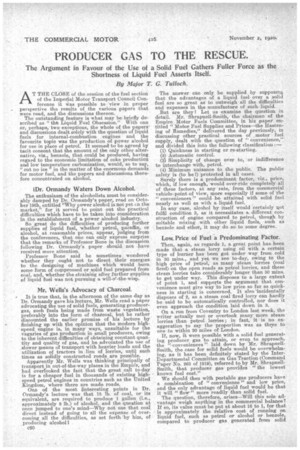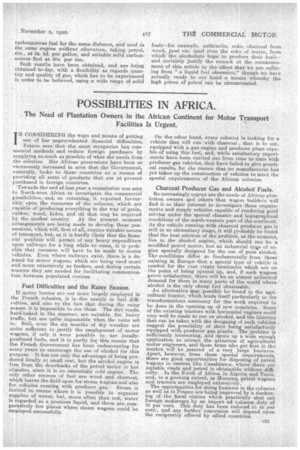PRODUCER GAS TO THE RESCUE.
Page 18

Page 19

If you've noticed an error in this article please click here to report it so we can fix it.
The Argument in Favour of the Use of a Solid Fuel Gathers Fuller Force as the Shortness of Liquid Fuel Asserts Itself.
By Major T. G. Tulloch. By Major T.
AT THE CLOSE of the session of the fuel section of the Imperial Motor Transport Council Conference it was possible to 'view in proper perspective the results of the various papers that were read, and the discussions thereon.
The outstanding feature is what may be briefly described as "the Liquid Fuel Obsession." With one or, perhaps, two exceptions, the whole of the papers and discussions dealt solely with the question of liquid fuels for internal-combustion engines and the favourite topic was the production of power alcohol for use in place of petrol. It seemed to) be agreed by tacit consent that the amount of the only other alternative, viz., benzole, that could be produced, having regard to the economic limitation of coke productioa and low temperature carbonization, would, so to say, "cut no ice" in the matter of the enormous demands for motor fuel, and the papers and discussions therefore concentrated on alcohol.
iDr. Ormandy Waters Down Alcohol.
The enthusiasm of the alcoholists must be considerably damped by Dr. Ormandy's paper, read on October 19th, entitled 'Why power alcoholisnot yet en the
market,,
: for it served to point out the practical difficulties which have to be taken into consideration in the establishment of a power alcohol industry. So great do the difficulties of producing further supplies of liquid fuel, whether petrol, paraffin, or alcohol, at reasonable prices, appear, judging from the conferences, that one can only express surprise that the remarks of Professor Bone in the discussion following Dr. Ormandy's paper should not have received more attention.
Professor Bone said he sometimes wondered whether they ought not to direct their energies to the designing of machines which would burn some form of compressed or solid fuel prepared from coal, and, whether the straining after further supplies of liquid fuel was not pursuing a will-&-the-wisp.
Mr. Wells's Advocacy of Charcoal.
It is true that, in the afternoon of the same day as Dr. Ormandy gave his lecture Mr. Wells read a paper advocating the use of solid fuels, generating producergas, such fuels being made from waste vegetation, preferably, into the form of charcoal, but he rather discounted the earlier promise of his lecture by finishing up with the opinion that the modern highspeed engine is, in many ways, unsuitable for the vagaries of gas production in small producers owing to the inherent difficulties of obtaining constant quantity and quality of gas, and he advocated the use of slower means of transport with heavier loads and the utilization of tractors in .lieu of lorries, until such times as solidly constructed roads are possible.
Apparently Mr. Wells was thinking principally of transport in out-of-the-way places in the Empire, and had overlooked the fact that the great call to-day is for a cheaper fuel in thousands of existing highspeed petrol engines in countries such as the United Kingdom, where there are made roads.
One of the most tinteresting points in Dr. Ormandy's lecture was that 15 lb. of coal, or its equivalent, are required to produce 1 gallon (i.e., approximately 8 lb.) of alcohol, and the question at once jumped to one's mind—Why not use that coal direct instead of going to all the expense of overcoming all the difficulties, as set forth by him, of producing alcohol?
c20 The answer can only be supplied, by supposing that the advantages of a liquid fuel over a solid fuel are so great as to outweigh all the difficulties and 'expenses in the manufacture of such liquid. But are they'? Let us examine the question in detail. Mr. Shrapnell-Smith, the chairman of the Empire Motor Fuels Committee, in his paper entitled "Motor Fuel Supplies and Prices—the Hastening of Remedies," delivered the day previously, in discussing other practical sources of motor fuel supply, dealt .with the question of " convenience," and divided this into the following classification :— (1) Quickness in starting or re-starting.
(2) Automatic control.
(a) Simplicity of change over to, or indifference to interchange with, petrol.
• (4) Minimum nuisance to the public. The public safety is (to be ?) protected in all cases.
Surely there is a predominant factor, viz. price, which, if low enough, would over-ride completely all of these factors, at any rate, from the commercial vehiclepoint-of view, more especially if some of the " conveniences" could be attained with solid fuel nearly as well as with a liquid fuel.
In any case, alcohol by itself would certainly ilot fulfil condition 3, as it necessitates a different construction of engine compared to petrol, though by suitable mixing with other liquid fuels, such as benzole and ether, it may do so to some degree.
Low. Price of Fuel a Predominating Factor.
Then, again, as regards 1, a great point has been made that a steam lorry using oil with a certain type of burner has been got under way from cold in 30 mins., and yet we see to-day, owing to the high priee of petrol, as many steam lorries (coal fired) on the open roads as petrol lorries, and these steam lorries take considerably longer than 30 mins. to get under way. This disposes to a large extent of point 1, and supports the argument that convenience must give way to low price so far as quickness in starting is concerned. It also -incidentally disposes of 2, as a steam coal fired lorry can hardly be said to be automatically controlled, nor does it even approach the condition laid down in 3.
On a ran from Coventry to London last week, the writer actually met or overtook many more steam lorries than petrol lorries ; in fact, it is no exaggeration to say the proportion was as three to one to within 20 miles of London.
If, now, ft were possible with a solid fuel generating producer gas to attain, or even to approach, the "conveniences" laid down by Mr. ShrapnellSmith, the case for solid fuels would be overwhelming, as it has been definitely stated by the InterDepartmental Committee on Gas Traction (Command Paper No. 263 of 1919), referred to by Mr. ShrapnellSmith, that producer gala provides "the lowest known fuel cost."
We should then with portable gas producers have a combination of " convenience " and low price, and the only advantage of liquid fuel would be that it will " flow " more readily than solid fuel.
The question, therefore, arises—Will this sale advantage weigh anything in the commercial balance? If so, its value must be put at about 16 to 1, for that is approximately the relative cost of running on liquid fuel, such as petrol or alcohol or benzole, compared to producer gas generated from solid
carbonaceous fuel for the same distance, and used in the same engine with,out alteration taking petrol,• .etc., at as. 8d. per gallon, and suitable solid carbonaceous fuel at 60s. per ton.
Such results have been obtained, and are being obtained to-day, with a flexibility as regards quantity and quality of gas, which has to be experienced • in order to be believed, using a wide range of solid fuels—for example, anthracite, coke, charcoal from wood, peat etc. (and even the cobs of maize, from which the alcoholists hope to produce their fuel)— and certainly justify the remark at the commencement, of this article to the effect that we are suffer: ing from " a liquid fuel obsession," though we have actually ready to our hand a means whereby the high prices of petrol can be circumvented.


























































